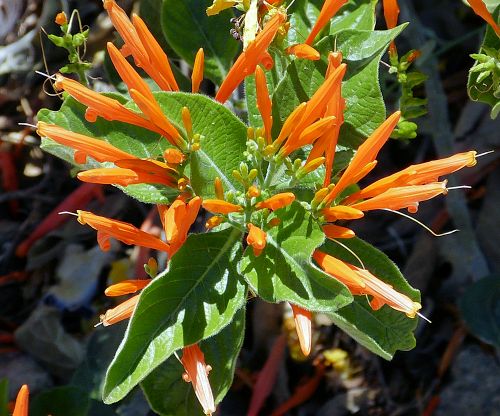Growing Justicia spicigera:
Mexican honeysuckle
Description
Form: A shrub with herbaceous stems that become woody from the bottom up with age.
Leaf retention: Evergreen.
Growth rate: Moderate.
Mature Size: 3' (90cm) high and 4' (120cm) wide.
Flowers: Bright orange, narrowly tubular, 1.5" (3.8cm) long, lower lip curled back tightly.
Bloom: All year in regions without freezes.
Fruit: Tiny capsules.
Leaves: Green, velvety surface, lance shaped, to 3" (7.5cm) long
Stems: Covered in fine hairs to smooth.
Wildlife: The flowers attract hummingbirds and butterflies. Justicia spicigera is a caterpillar food plant for the Texan Crescent butterfly. It is deer resistant.
Toxic / Danger: No.
Origin: Mexico, Central America.
Form: A shrub with herbaceous stems that become woody from the bottom up with age.
Leaf retention: Evergreen.
Growth rate: Moderate.
Mature Size: 3' (90cm) high and 4' (120cm) wide.
Flowers: Bright orange, narrowly tubular, 1.5" (3.8cm) long, lower lip curled back tightly.
Bloom: All year in regions without freezes.
Fruit: Tiny capsules.
Leaves: Green, velvety surface, lance shaped, to 3" (7.5cm) long
Stems: Covered in fine hairs to smooth.
Wildlife: The flowers attract hummingbirds and butterflies. Justicia spicigera is a caterpillar food plant for the Texan Crescent butterfly. It is deer resistant.
Toxic / Danger: No.
Origin: Mexico, Central America.
Cultivation and Uses
USDA hardiness zones: 8-11. This plant suffers damage at 25°F (-3.9°C) and dies to the ground in lower temperatures. It will regrow from its roots in the spring.
Heat tolerant: Yes.
Drought tolerant: Yes.
Sun: Full sun. Shade reduces blooms and causes the plant to become leggy.
Soil: Well draining, pH 6.6-8.5 (neutral to alkaline). Little to no fertilization is required, but an organic fertilizer can be applied once a year. This plant has low to slightly moderate salt tolerance.
Water after becoming established: Once or twice a month. Although not needed for survival, weekly watering in hot, dry seasons of the year improves its appearance and blooming. The soil must dry out between waterings. Overwatering reduces flowering.
Mulch: Only during winter when freezes are predicted. Remove mulch after the last freeze so the soil can dry quickly after a rain or irrigation.
Planting: Justicia spicigera can be grown in large containers.
First Year Care: Water every day, in the morning, just enough so that the soil is dry the next morning, to establish an extensive root system. Yellow leaves can indicate either over-watering or under-watering.
Prune: When the danger of frost is past in late winter, remove frost-damaged parts and remove older, woody stems. Trim to a more compact form if it becomes leggy.
Litter: Low.
Propagation: Stem cuttings; layering (bending a stem over, burying its top in the ground, and fastening it down so that it will root). The rootball can be subdivided and transplanted.
Uses: Ornamental, hummingbird garden. The leaves can be boiled to release a blue dye.
USDA hardiness zones: 8-11. This plant suffers damage at 25°F (-3.9°C) and dies to the ground in lower temperatures. It will regrow from its roots in the spring.
Heat tolerant: Yes.
Drought tolerant: Yes.
Sun: Full sun. Shade reduces blooms and causes the plant to become leggy.
Soil: Well draining, pH 6.6-8.5 (neutral to alkaline). Little to no fertilization is required, but an organic fertilizer can be applied once a year. This plant has low to slightly moderate salt tolerance.
Water after becoming established: Once or twice a month. Although not needed for survival, weekly watering in hot, dry seasons of the year improves its appearance and blooming. The soil must dry out between waterings. Overwatering reduces flowering.
Mulch: Only during winter when freezes are predicted. Remove mulch after the last freeze so the soil can dry quickly after a rain or irrigation.
Planting: Justicia spicigera can be grown in large containers.
First Year Care: Water every day, in the morning, just enough so that the soil is dry the next morning, to establish an extensive root system. Yellow leaves can indicate either over-watering or under-watering.
Prune: When the danger of frost is past in late winter, remove frost-damaged parts and remove older, woody stems. Trim to a more compact form if it becomes leggy.
Litter: Low.
Propagation: Stem cuttings; layering (bending a stem over, burying its top in the ground, and fastening it down so that it will root). The rootball can be subdivided and transplanted.
Uses: Ornamental, hummingbird garden. The leaves can be boiled to release a blue dye.
Comments
This plant is a member of the Acanthus family (Acanthaceae). Other common names are Firecracker Bush and, in Spanish, Muicle. The butterfly in the picture is a Gulf Fritillary.
Do you have additional information or a different experience for these plants that you would like to share? Email info@GardenOracle.com. All contributions are welcome and appreciated.
This plant is a member of the Acanthus family (Acanthaceae). Other common names are Firecracker Bush and, in Spanish, Muicle. The butterfly in the picture is a Gulf Fritillary.
Do you have additional information or a different experience for these plants that you would like to share? Email info@GardenOracle.com. All contributions are welcome and appreciated.



Latest update: September, 2024
© 2008-2026 by GardenOracle.com

